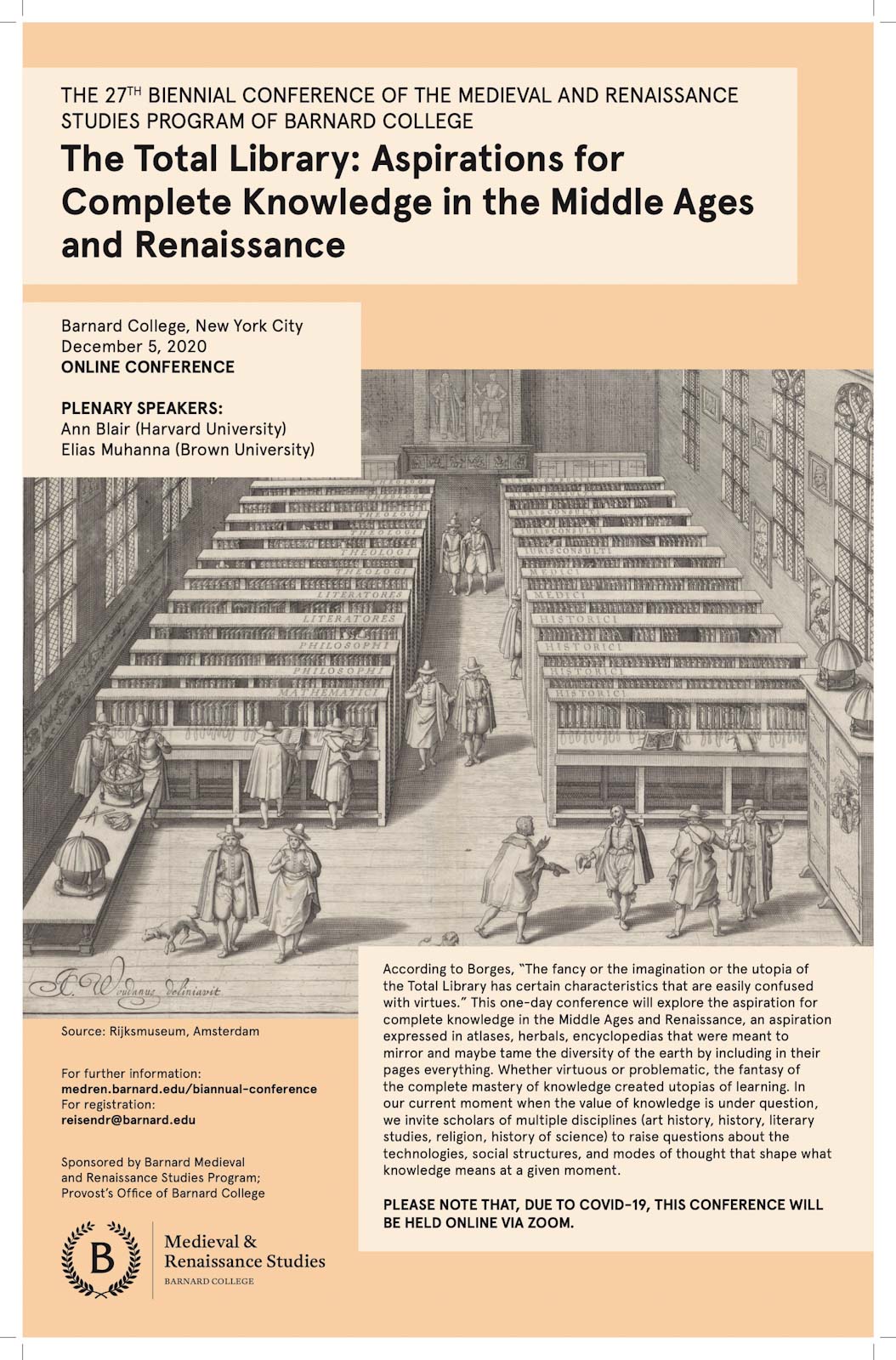2020: The Total Library
The Total Library: Aspirations for Complete Knowledge in the Middle Ages and Renaissance
Thank you for your interest in the Barnard Medieval & Renaissance Conference.
We regret to inform you that our conference is now sold out to capacity.
Medieval and Renaissance Studies Program, Barnard College
December 5, 2020 ONLINE CONFERENCE
According to Borges, “The fancy or the imagination or the utopia of the Total Library has certain characteristics that are easily confused with virtues.” This one-day conference will explore the aspiration for complete knowledge in the Middle Ages and Renaissance, an aspiration expressed in atlases, herbals, encyclopedias that were meant to mirror and maybe tame the diversity of the earth by including in their pages everything. Whether virtuous or problematic, the fantasy of the complete mastery of knowledge created utopias of learning. In our current moment when the value of knowledge is under question, we invite scholars of multiple disciplines (art history, history, literary studies, religion, history of science) to raise questions about the technologies, social structures, and modes of thought that shape what knowledge means at a given moment.

9-10AM
Plenary I
Elias Muhanna, Brown University
Introduction: Laurie Postlewate
“The Accidental Encyclopedia”
Encyclopedic compilation was one of the most common forms of book-making in the medieval Arabic-Islamic world, experiencing a golden age in the Egyptian and Syrian territories of the Mamluk Sultanate, between the 13th and 15th centuries. The fruits of this scholarly activity included anthologies, cosmographies, dictionaries, onomasticons, commentaries, and chronicles, all of which depended upon the sorting and arranging of materials from different subjects into ambitious new forms. A curious aspect of compilatory practice in the Mamluk period is that the encyclopedic character of many works seems an ‘accidental’ property rather than a self-conscious convention. Authors often seem oblivious to the encyclopedic creep of their books, regarding them as examples of tidy literary genres rather than the genre-defying baggy monsters that strike our fancy today. I address this accidental encyclopedism in a few works by figures such as al-Qalqashandi, Ibn Nubata, al-Safadi, al-Nuwayri, and al-Dhahabi, suggesting that it had a social basis in changing patterns of education and scribal practice in Cairo and Damascus.
10:15-11:45
Session I
What Does Complete Knowledge Look Like? Tree, Theatre, Library
Moderator: Gregory Bryda
- Martin Eisner, Duke University: “Boccaccio’s Trees: The Character of an Index”
- Adam Rzepka, Montclair State University: “John Willis’s Art of Memory and the Theater of Everyday Life”
- Eleonora Pistis, Columbia University: “Four Walls, One World, and ‘Infinite Variety’: The Architecture of Knowledge”
1-2
Plenary II
Ann Blair, Harvard University
Introduction: Alan Stewart
“Renaissance encyclopedias and the tension between brevity and copiousness”
The “encyclopedia” was not a clearly defined genre before the 18th century. A wide range of works of the late Renaissance have been considered encyclopedic, by historians and by authors at the time (for example in the list of antecedents cited by Johann Heinrich Alsted in his Encyclopedia of 1630). I focus on their variability in size, from short books offering definitions and diagrams of the disciplines to huge compilations of material. The former touted their orderly and methodical approach; the latter sought to offer something for everyone, often without an effective ordering system, but with an alphabetical index instead. In this talk I’ll examine the tension between the virtues of brevity and of copia among early modern encyclopedic writers, with some attention to medieval Latin examples. The commercial benefits that some printers associated with big books and the new humanist admiration for copia were factors that favored longer and longer works. Authors of large encyclopedic works emphasized their goal of striking a balance between being too brief (at the risk of being misleading or incomplete) and too prolix (at the risk of being tedious, as exemplified in their discussions by the late medieval theologian Thomas Hasselbach).
2:15-3:45
Session II
Between Worlds: Perceptions and Misperceptions across Borders
Moderator: Matthew Keegan
- Iris Montero, Brown University: “Pliny in Tlatelolco: Natural History Between Two Worlds"
- Alexander Peña, Yale University: “Treading Knowledge into the Dust: Medieval Arabic-Latin Translation and the Precarity of the Historical Past"
- Kevin Windhauser, Columbia University: “Who Burned Alexandria? Edward Pococke’s Specimen Historiae Arabum and the Orientalizing of the Total Library”
4-5:30
Session III
The Challenges of Encyclopedism
Moderator: Seth Stewart Williams
- M. A. Mujeeb Khan, University of Utah: “The Comprehensive and the Essential: Complete Medicine in Medieval Islamicate and Japanese Encyclopedism”
- Fan Wang, University of Massachusetts, Amherst: “‘The Blessed Land of Lang Huan’: The Rewards and Frustrations of the Encyclopedic Library in Early Modern China”
- Sean O’Neil, New York University: “Renaissance Shorthand as Humanist ‘Method’”
- Luis Rodríguez-Rincón, Haverford College: “Natural History and the Pagan Gods in the Secret Philosophy of Juan Pérez de Moya”
5:45-6:30
Concluding Discussion